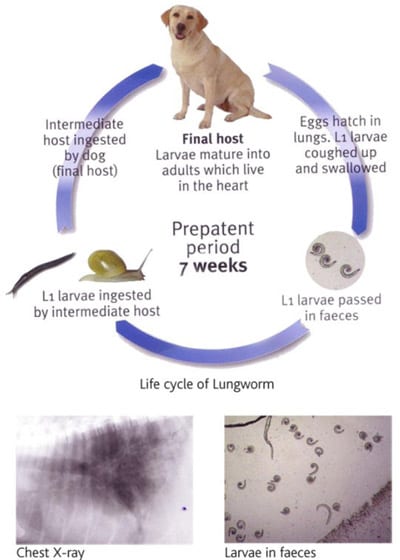Greyhound Bloat & Lungworm
All dogs, not just greyhounds, are susceptible to bloat and lungworm.
Bloat
This condition is fatal if not treated quickly enough. One way to avoid bloat is to allow you greyhound or lurcher to eat from a raised feeder and to feed 2-3 times a day. We sell the raised feeders in our online shop.
It is thought that exercise may also contribute to bloat. Try to exercise you dog in between meals and not close to meal times. Gentle lead walking is OK but no vigorous exercise should be allowed a couple of hours before or after meals.
Bloating can occur without notice and might even be mistaken for indigestion. It can sometimes have the appearance of a bloated belly, which is where the name comes from, and you may even see the stomach twisting and turning. Once the stomach starts to twist and turn it can torsion, which can be fatal. Bloat cuts off the circulation in the stomach so blood gets pushed into the main organs while the stomach dies.
Lungworm
Lungworm Angiostrongylus vasorum (also known as French Heartworm) is a parasite that infects dogs. The adult of this particular lungworm lives in the heart and major blood vessels supplying the lungs, where it can cause a host of problems. Left untreated, the infection can often be fatal.
Lungworm is spreading very quickly throughout the south east and vets are seeing more and more cases of it. Regular worming treatments do not protect against lungworm – even if your dog is being wormed monthly so it is important to be aware of the symptoms and seek treatment from your vet if you are concerned. It is easily treatable and most dogs do make a full recovery once they have been diagnosed and treated but the key is to catch it early.
A monthly treatment of Advocate can prevent lungworm. A prescription only SpotOn treatment that also treats fleas.
How does Lungworm spread?
Lungworm is spread by slugs and snails and infection spreads to dogs when they accidentally or purposefully eat them. Juvenile slugs and snails are often so small that dogs may accidentally ingest them while eating grass, drinking from outside puddles or toys that have been left out overnight. Foxes can also spread lungworm so be aware in areas that have a high fox population. Care should be taken if you have a dog that likes to eat poo as eggs are left behind in the faeces of infected animals.
There is currently debate about whether or not lungworm eggs can be left behind in snail and slug trails and infection can occur that way but as of yet there is no consensus.
Symptoms of Lungworm
Any dog can contract lungworm. But, those most at risk appear to be younger dogs and those that scavenge (especially those who eat slugs and snails).
Unfortunately symptoms of lungworm can easily be confused with other illnesses. But if your dog displays any of the signs below please consult a vet immediately:
- Breathing problems – coughing and tiring easily
- Poor blood clotting. Excessive bleeding from even minor cuts and wounds, anaemia (evidenced by paleness around the eyes and of the gums), nose bleeds and bleeding into the eyes.
- General sickness – weight loss, vomiting, diarrhoea and poor appetite
- Changes in behaviour – depression and seizures
This page is for information only. You must consult your vet for professional advice.
Do you follow us on Facebook and Instagram?
Everyone at Kent Greyhound Rescue is a volunteer. Our online shop really helps us to pay our kennel and vets bills. We sell everything you need for your dog and all proceeds help the rescue.
Have you looked at our other Health and Welfare information?



